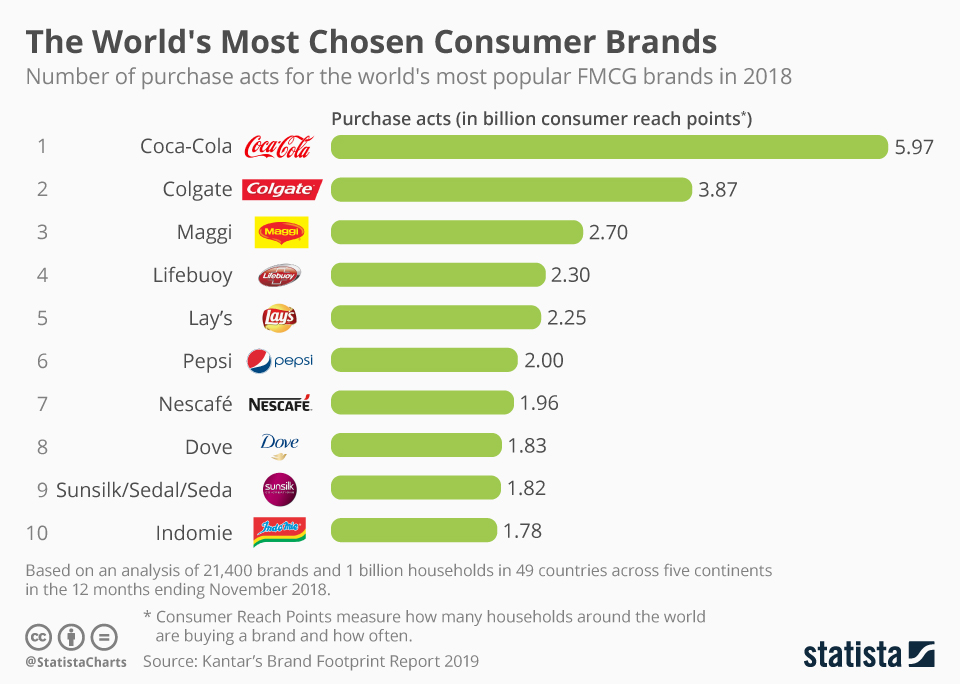Before we dive deep into the SWOT analysis, let’s get the business overview of Colgate-Palmolive. Colgate-Palmolive Company is a multinational consumer products corporation specializing in producing, distributing, and selling various household, healthcare, and personal care products.
The company was founded in 1806 by William Colgate as a soap and candle business in New York City. Over the years, it has expanded its product offerings and geographical presence, becoming one of the leading global brands in the consumer products sector.
The company operates through two main segments:
- Oral, Personal, and Home Care: Colgate-Palmolive is best known for its oral care products, including toothpaste, toothbrushes, mouthwash, and dental floss, under the brand name “Colgate.” In addition to oral care, the company also manufactures personal care products like soaps, shower gels, and deodorants under various brand names, such as Palmolive, Irish Spring, and Sanex. The home care product line includes detergents, fabric conditioners, and dishwashing liquids under brands like Ajax, Fabuloso, and Soupline.
- Pet Nutrition: Colgate-Palmolive’s pet nutrition division, primarily under the “Hill’s Science Diet” and “Hill’s Prescription Diet” brands, provides high-quality pet food for cats and dogs. These products cater to the specific nutritional needs and health conditions of pets, emphasizing the importance of scientific research in creating products that promote pet health and well-being.
Colgate-Palmolive operates in more than 200 countries and territories worldwide, with manufacturing facilities spread across the globe. The company’s products are marketed through direct sales, distributors, retailers, and e-commerce channels.
Financial Performance 2023: Financially, Colgate-Palmolive has a robust balance sheet and has consistently delivered revenue growth and profitability. Worldwide Net sales were $19,457 Mn in 2023, up 8.5% from 2022, and Operating profit increased 38% to $3,984 Mn in 2023 from $2,893 Mn in 2022.
Here’s a SWOT analysis for Colgate-Palmolive:
A SWOT analysis is a strategic planning tool used to evaluate the Strengths, Weaknesses, Opportunities, and Threats of a business, project, or individual. It involves identifying the internal and external factors that can affect a venture’s success or failure and analyzing them to develop a strategic plan. In this article, we do a SWOT Analysis of Colgate-Palmolive.
SWOT Analysis: Meaning, Importance, and Examples
Strengths
- Strong brand recognition: Colgate is a globally recognized brand, with its products being synonymous with oral care for millions of consumers worldwide. The company’s long history and reputation for quality have helped build customer trust and loyalty.
- Diverse product portfolio: Colgate-Palmolive offers various products across different categories, including oral care, personal care, home care, and pet nutrition. This diversification reduces the company’s reliance on a single product category and allows it to cater to various consumer needs.
- Extensive global presence: With operations in over 200 countries and territories, Colgate-Palmolive benefits from a broad customer base and significant economies of scale. This global footprint enables the company to adapt to regional market dynamics and capitalize on growth opportunities in emerging markets.
- Research and development (R&D): Colgate-Palmolive invests heavily in R&D to drive innovation, improve product quality, and develop new offerings. This focus on innovation ensures that the company stays ahead of the competition and meets evolving consumer preferences.
- Effective marketing strategies: Colgate-Palmolive is known for its strong marketing campaigns that effectively communicate the benefits of its products to consumers. The company uses a mix of traditional and digital marketing channels to create brand awareness and drive sales.
- Commitment to sustainability: Colgate-Palmolive has made sustainability a core aspect of its business strategy. The company focuses on reducing its environmental footprint, promoting ethical sourcing, and supporting community initiatives. This commitment to sustainability helps reduce operational costs, enhances the company’s reputation, and appeals to environmentally conscious consumers.
- Strong financial performance: Colgate-Palmolive has consistently delivered solid financial results, with stable revenue growth and profitability. This strong financial performance enables the company to invest in growth initiatives, R&D, and shareholder value creation.
Weaknesses
- Dependence on the oral care segment: While Colgate-Palmolive has a diverse product portfolio, its oral care segment is the most significant contributor to its revenues. This reliance on a single product category can expose the company to risks of changing consumer preferences or increased competition in the oral care market. Sales of Oral, Personal, and Home Care products accounted for 44%, 20%, and 17% of its total worldwide Net sales in 2021. Geographically, Oral Care is a significant part of Colfgate’s business in Asia Pacific, comprising approximately 81% of Net sales in that region for 2021.
- Intense competition: Colgate-Palmolive faces strong competition from other multinational and local consumer goods companies, such as Procter & Gamble, Unilever, and GlaxoSmithKline, in various product categories. Intense competition can lead to price wars, reduced market share, and pressure on profit margins.
- Vulnerability to currency fluctuations: Colgate-Palmolive is exposed to currency fluctuations that can impact its financial performance as a multinational company. Changes in exchange rates can affect the company’s revenue, costs, and profitability, making it more challenging to plan and forecast financial results accurately.
- Potential supply chain disruptions: Colgate-Palmolive relies on an extensive network of suppliers for raw materials and components. Any disruption in the supply chain, such as political unrest, natural disasters, or trade restrictions, can lead to increased costs, delays, or shortages of essential materials, negatively affecting the company’s operations and profitability.
- Slow response to changing consumer trends: Although Colgate-Palmolive invests in R&D and innovation, the company has sometimes been slow to respond to changing consumer preferences and trends, such as the demand for natural and organic products. This slow response can result in missed opportunities or loss of market share to more agile competitors.
 You will find more infographics at Statista
You will find more infographics at Statista
Opportunities
- Investing in natural and organic products: As consumers become more environmentally conscious and health-focused, there is a growing demand for natural and organic products. Colgate-Palmolive can leverage this trend by developing and expanding its offerings in this category, capturing a share of this growing market segment.
- Strengthening e-commerce channels: With the rise of online shopping, there is an opportunity for Colgate-Palmolive to boost its e-commerce presence and reach a broader customer base. The company can drive online sales and increase overall revenue by enhancing its digital platforms, offering personalized shopping experiences, and improving online marketing strategies.
- Innovation in product offerings: Continuous investment in research and development can lead to innovative products that cater to evolving consumer preferences. By identifying emerging trends and leveraging new technologies, Colgate-Palmolive can differentiate itself from competitors and maintain its position as an industry leader.
- Strategic acquisitions and partnerships: Colgate-Palmolive can explore strategic acquisitions or partnerships with other companies to expand its product portfolio, gain access to new markets, or enhance its technological capabilities. Such collaborations can help the company grow rapidly and achieve economies of scale.
- Sustainability initiatives: As sustainability becomes increasingly important to consumers and investors, Colgate-Palmolive can further develop its environmental and social initiatives. By focusing on reducing waste, promoting energy efficiency, and supporting community programs, the company can enhance its reputation and appeal to environmentally conscious customers.
- Personalization and customization: Colgate-Palmolive can leverage data analytics and customer insights to offer personalized and customized products. By understanding individual consumer preferences and needs, the company can create targeted marketing campaigns and develop products that cater to specific customer segments, driving customer loyalty and increasing sales.
- Expanding the pet nutrition segment: With the global pet care market experiencing significant growth, Colgate-Palmolive can invest in expanding its pet nutrition offerings, particularly in premium and specialized pet food products. This expansion can help the company diversify its revenue streams and capitalize on the growing demand for high-quality pet care products.
Threats
- Intense competition: Colgate-Palmolive operates in a highly competitive market, with numerous global and local players vying for market share. Intense competition can lead to price wars, increased marketing expenses, and pressure on profit margins, making it difficult for the company to maintain or grow its market share.
- Economic fluctuations: Colgate-Palmolive is exposed to financial volatility in various markets as a multinational company. Economic downturns, changes in consumer spending habits, or currency fluctuations can negatively impact the company’s revenue and profitability.
- Changing consumer preferences: Consumers’ preferences and needs continuously evolve, driven by health awareness, environmental concerns, and technological advancements. Failure to adapt to these changes and meet consumer demands can result in a loss of market share and damage the company’s reputation.
- Regulatory changes: Colgate-Palmolive is subject to various laws and regulations in its operating countries. Changes in these regulations, such as those related to product safety, environmental protection, or import/export restrictions, can increase compliance costs and affect the company’s operations.
- Supply chain disruptions: Colgate-Palmolive relies on an extensive network of suppliers for raw materials and components. Disturbances to the supply chain, such as political unrest, natural disasters, or trade restrictions, can lead to increased costs, delays, or shortages of essential materials, negatively affecting the company’s operations and profitability.
- Intellectual property infringement: Colgate-Palmolive’s success relies on its ability to protect its intellectual property rights, including patents, trademarks, and trade secrets. Infringement of these rights by competitors or counterfeiters can undermine the company’s competitive advantage and result in financial losses.
- Cybersecurity risks: As the company increasingly relies on digital technologies and e-commerce platforms, it becomes more vulnerable to cybersecurity threats. Data breaches, cyberattacks, or other security incidents can result in financial losses, reputational damage, and potential legal liabilities.
- Growing popularity of private-label products: The rise of private-label products from retailers can threaten Colgate-Palmolive’s market share. These products are often sold at lower prices and can appeal to cost-conscious consumers. The company must differentiate its products and maintain a strong value proposition to compete effectively with private-label offerings.











